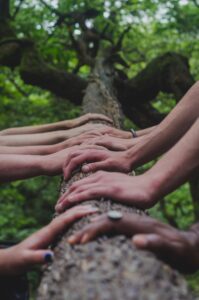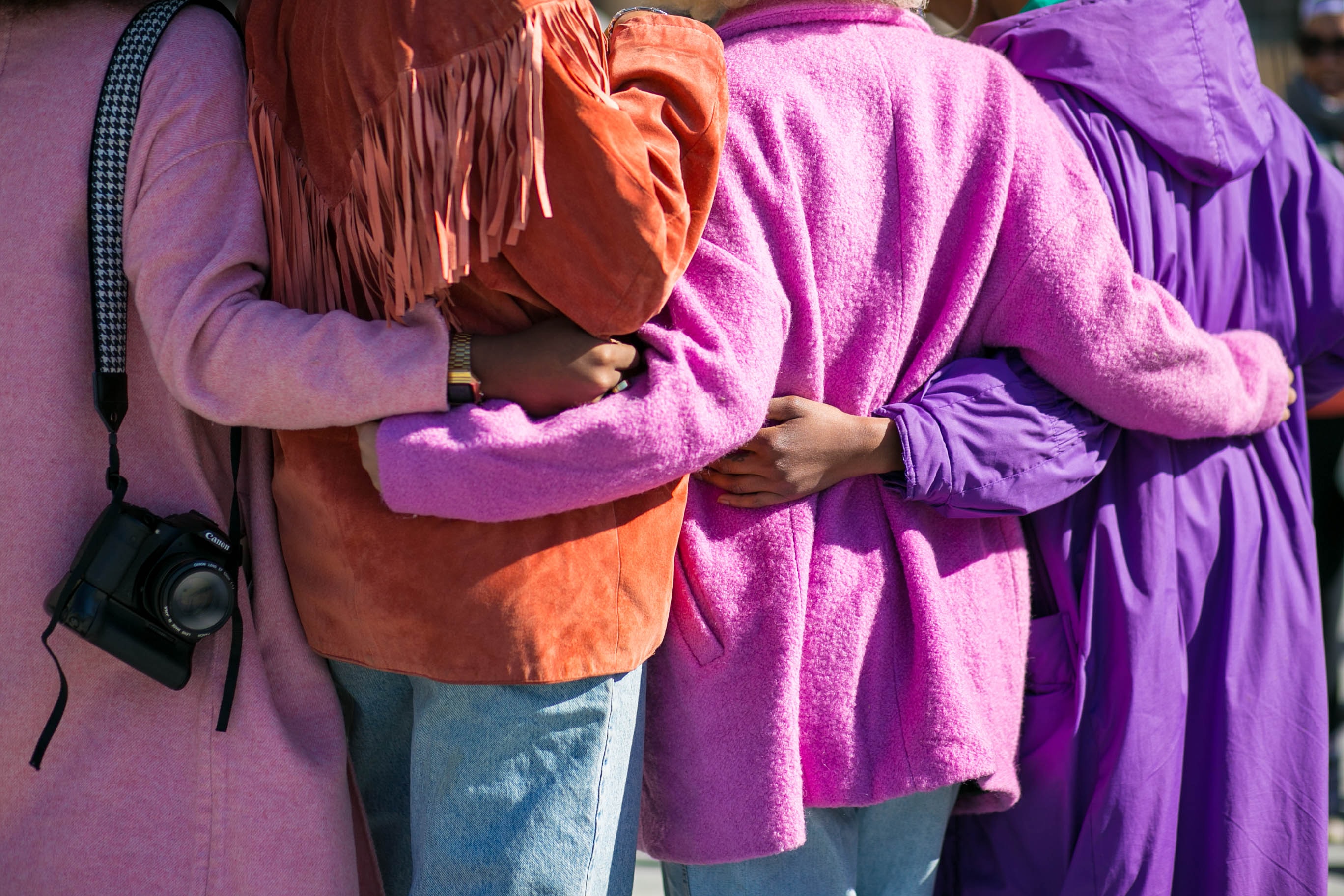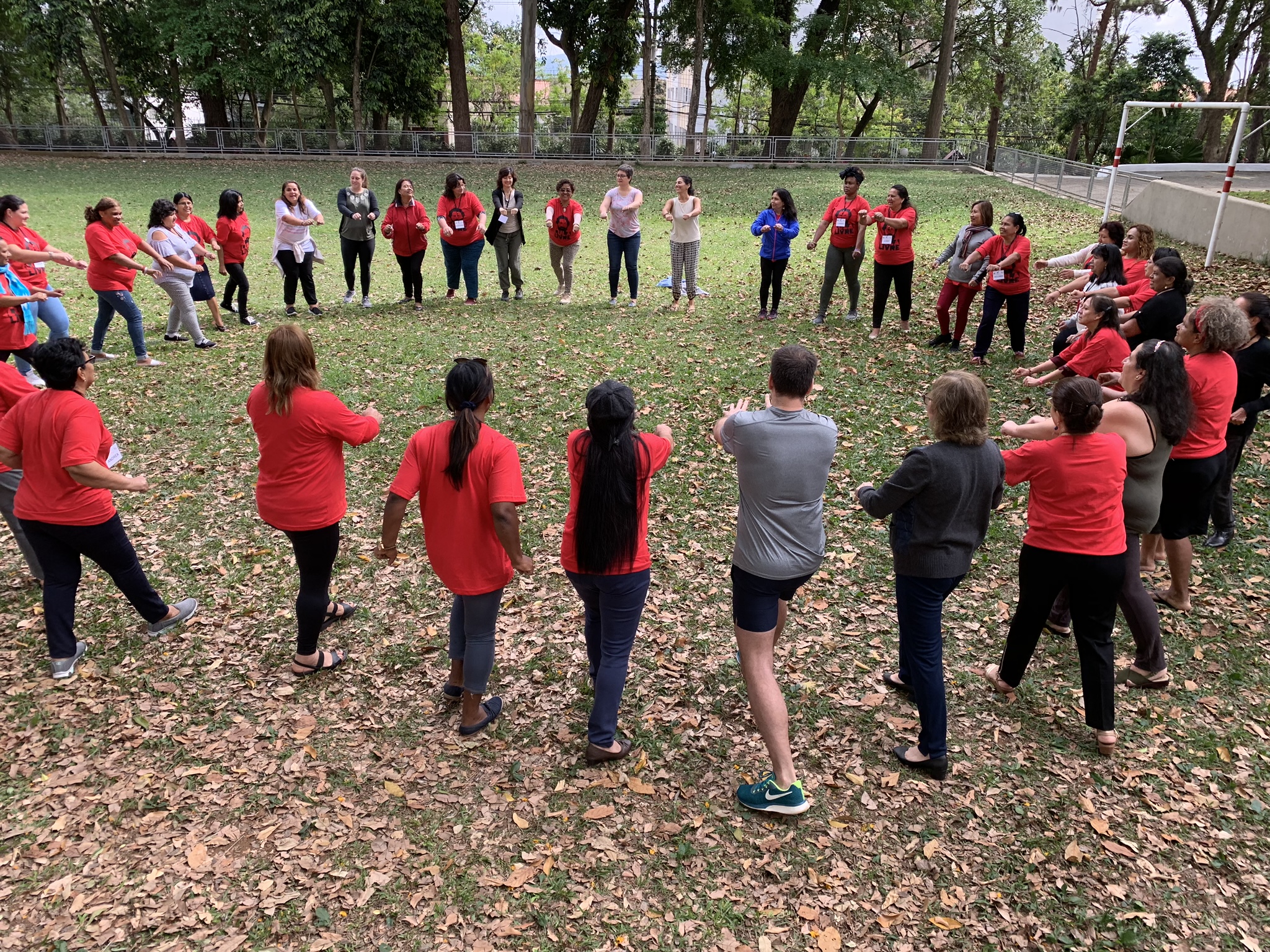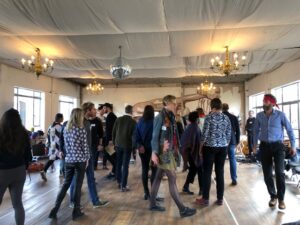 On Wednesday, April 14, 2021, the EDGE Team was really grateful to host an EDGEy Wednesday conversation on Inner-Led Transformation. Organised by Romy Kraemer (Guerrilla Foundation) and Janosch Sbeih (Full Circle Foundation), this meeting explored the role and importance of inner work for social change and how foundations might support activists and grassroots organizers by funding personal transformation and work at the level of organisational culture.
On Wednesday, April 14, 2021, the EDGE Team was really grateful to host an EDGEy Wednesday conversation on Inner-Led Transformation. Organised by Romy Kraemer (Guerrilla Foundation) and Janosch Sbeih (Full Circle Foundation), this meeting explored the role and importance of inner work for social change and how foundations might support activists and grassroots organizers by funding personal transformation and work at the level of organisational culture.
Here below, we are offering a snapshot of the presentations given by our organizers and speakers. We have also uploaded the recording of the webinar online, but decided to keep it password protected to maintain the privacy of our participants. If you are interested in watching it, you can reach out to the EDGE team.
Sign up here for a slot to run your own EDGEy Wednesday on any topic that is alive for you and your foundation. Contact Janosch or Romy if you have ideas for how we might continue our discussions about inner work and social change with a focus on Europe. We look forward to hearing from you and are especially interested in building the field for supporting inner work, sharing experiences & grantees, and overcoming obstacles to funding this kind of work.

Janosch Sbeih, Programme Consultant at Full Circle Foundation (Regenerative Cultures & Economies; System Interventions)
“All the interlocking crises we see around us have their origin on the inner plane. They are the symptoms of a civilisational way of being, thinking and perceiving coming to an end.
The primary obstacles we face in the transition ahead of us are not of technological or strategic nature. The challenge is much more to loosen the grip of our deeply engrained worldviews, our ways of approaching problems and how we relate to the living world around us.
We have been brought up to perceive everything and everyone through a transactional lens: how can this or that relationship be useful for my agenda or my personal needs? How valuable is this or that ecosystem function for our economy?
The underlying root that enables such a mindset is the same that leads us to resort to domination, extraction and stripping other individuals, cultures and species of their intrinsic right and worth of existence.
We perceive ourselves to be separate entities, sheltered and insulated from the thriving or suffering of life around us. This creates the hubris of our civilisation to think we can manage and control how life on Earth ought to function, so that it fits into our plans and schemes.
Unless we take the steps to enter back into a relational way of being (which has been the case for the majority of humanity’s history) and place ourselves in service of the thriving of life and diversity for its own sake, we run the risk to unwittingly reproduce the same modalities that brought us into our current state.
I believe two inner qualities that funders and professionals of our sector are well advised to cultivate are humility and a sense of service. If we perceive ourselves to be the great orchestrators, we are at risk of developing the same hubris that brings about the worst manifestations of our sector. The presence of these qualities is something that I greatly appreciate within the EDGE Alliance.”
Romy Kramer – Managing Director at Guerrilla Foundation
Romy briefly spoke about the importance of these practices within the foundation as well as in their work with activists and grassroots organizers. She raised the question of the commodification of mindfulness and the challenge that very often the assumed I – We – World connection is perceived as a linear progress that starts with – and unfortunately often remains focused on – the individual aspect. Funding inner transformation work successfully means considering all these aspects at the same time.
Claire Milne and Eva Schonveld, Co-Founders of Starter Culture
What is “inner change”?
When talking about the ‘inner’ people tend to presume we are speaking only to personal, individualised experience. For us at Starter Culture however, inner-led change refers to the richly relational, interpersonal, social, cultural, political, spiritual and other-than-human dimensions of life.
Co-creating healthy cultures

Our work around inner-led change arose in response to the extent to which social and ecological change efforts are being so dramatically thwarted by our neglect of the inner dimension.
Cultures of burnout, conflict, othering, polarization and unhealthy power and group dynamics have become the norm – and are a direct result of alienation from our inner worlds and lack of support for inner-led change.
Inner-led change is about creating cultures that support healing and integration around the fragmentation and sense of separation and scarcity that underpin the unhealthy cultures driving our current crises – and preventing our groups and movements from having the impact they long for.
What’s more it’s this fragmented state of consciousness that also underpins the individualisation, commodification and lack of awareness around systemic injustice within the ‘wellbeing’ community.
Politicizing the inner: the role of collective trauma
We understand this fragmented state of human consciousness to result from aeons of historic collective trauma. We believe that this trauma is revealing itself in more and more of us because we are now ready to heal and co-create a new, more integrative, unified and life-affirming consciousness grounded in more collectively-driven, Love-centred and collaborative ways of being and relating in the world. We believe that the current unravelling of this millennia-old historic collective trauma is life’s current evolutionary intent – and that we resist, avoid or ignore it at our collective peril.
Our work at Starter Culture is therefore about centering and politicizing inner-led change to raise awareness that any attempts around decolonizing, climate change and ecological regeneration, in the absence of support around trauma-informed inner-led change, can only ever remain as lip service.
Collaboration across difference: co-creating relational cultures
We believe that the changes needed for us to learn to truly collaborate across difference are rooted in decolonising at depth – and are precisely what is needed for us to evolve as a species in ways that are life-affirming and regenerative. Without support around inner-led change we can only continue to source our solutions from the colonising consciousness that created this crisis.
Inner-led change is about transforming both ourselves and our group cultures so we can perceive new ways of sourcing solutions to the challenges we face. As allies, it can help us to transform our call-out cultures into compassionate calling-in cultures. The way that we call others out, in our good intentions around being an ally, is often an unconscious playing out of our unprocessed guilt that results from historic trauma and ancestral imprints around colonialism. This unconscious externalisation and projection of our own guilt is so very painful for others to relate with, and tends to evoke a lot of understandable defensiveness in others, who also do not want to relate with their own guilt. Inner-led change is grounded in an inquiry around learning to love in more and more expansive ways, and especially those parts of ourselves, and other people, we find hardest to love.
Our work is about supporting the co-creation of the relational cultures needed for a truly collaborative approach to deep cultural transformation to flourish.
Elephants in the room
 It is very challenging for grantees to be honest with their funders about the extent to which burnout, conflict and unhealthy power and group dynamics are undermining their efforts and impact. We are using our collective vantage point, having been in conversation with well over 100 organisations and practitioners, to reveal this elephant in the room.
It is very challenging for grantees to be honest with their funders about the extent to which burnout, conflict and unhealthy power and group dynamics are undermining their efforts and impact. We are using our collective vantage point, having been in conversation with well over 100 organisations and practitioners, to reveal this elephant in the room.
Without support from funders to integrate inner-led change, groups and movements will remain between a rock and a hard place in terms of accessing the support they need to be truly effective in their vital efforts.
Measuring the emergent impacts of inner-led change
We are currently exploring the creative tension between funders’ understandable need for ‘measurables’ and long term strategy and the inherently emergent nature of inner-led change and the different landscape it inhabits in relation to measuring impact. We are also integrating inner-led evaluation, expanding tools for this way of evaluating and collating an evidence base around inner-led change. We want to serve a new approach and consciousness around measurement – one that moves away from reductionist ideas of what success looks like.
Making support around inner-led change widely accessible
As our global mental health crises continues to escalate, it is becoming increasingly difficult to bury our heads in the sand in regard to the need for widespread support around inner-led change.
Inner-led change is what gives each of us access to the resilience needed to experience wellness and share our gifts in the world, regardless of our outer circumstances. It is how we free ourselves of our addiction to consumerism and capitalism – and step towards collective liberation.
Support around inner-led change is currently largely only accessible to a privileged few. This needs to change if we are serious about collective liberation in service of all beings. Inner-led change needs to become widely accessible so that everyone, and especially those most marginalised, are able to liberate themselves from the stranglehold of our current cultural conditioning and the prisons this keeps us all in.
We at Starter Culture would love to connect with those funders interested in collaborating to make support around inner-led change available, accessible and relevant to everyone – not just the privileged few, so that together we can move towards serving the deep cultural transformation these increasingly turbulent times demand.
Visit our website for more information about our work around measuring and evidencing the inner.”
Dr Justine Huxley, CEO of St Ethelburga‘s Centre for Reconciliation and Peace
Let’s talk about inner life and social change. If you look at the great movements that have transformed the face of the world – those for womens emancipation, or for Black Liberation for example – what you find is that these movements are started by people who’ve had every form of external power stripped from them. They have no status in the eyes of the law or larger society, no credibility. They have no political leverage and no money. This is where we normally locate power, somewhere in the external world. Where do these people get power? The answer is, the only place where no one can take it from you. That’s the human heart. The human spirit. The inner life.
Justine shared how she and her colleagues at St Ethelburga’s build their programmes and activities around aspects of ‘the inner’:
“Humanity is increasingly facing situations – such as the global pandemic and climate breakdown – over which we appear to have little control as individuals. However, even as things worsen, we will still have the freedom to choose how we meet the various challenges coming at us from all sides. Whether they cause us to fracture and fall apart, or if we let them inspire us to pull together and reconnect with what is fundamental to being human.
St Ethelburga’s mission is to build community resilience for times of global emergency. We see inner resilience and outer resilience as completely inseparable. Our model of resilience is primarily values based. We believe that now is the time to get clear on what we stand for, and that we need to prepare ourselves to live those values no matter how tough things get.
Living our values is powerful. If I imagine walking into a future of ecocide – it’s terrifying. If I imagine walking into that future with my most deeply held values alive in my heart – for example to be of service – then something lights up in me and it becomes a testing ground for the spirit – something to be met with joy.”
St Ethelburga’s works with a variety of tools and practices for different aspects of resilience with an inner dimension:
“Firstly, courage – and specifically moral courage – is a theme we are working with in response to the very dangerous current landscape of polarisation, and the strategic use of disinformation that is threatening our democracies.
We see a need for us to grow our collective capacity to live from a place of integrity. Integrity that refuses to sit in an echo chamber and refuses to ‘other’ people no matter their politics or what side of the culture war they sit on. Integrity that includes a willingness to face historical harms, and to know our own complicity in systems of oppression.
In this landscape where there are growing barriers to freedom of speech and very real consequences to speaking one’s truth in the public space, we believe real change will require the ability to speak from a deeper place: A place not caught up in those divisions, that can catalyse a shared moral imagination fit for these times. Morality is partly outwards: it requires community. However, we cannot call to this deeper moral evolution, unless we have the means to separate ourselves from collective thinking and be guided from within.
Secondly, we will be living through much loss and heartbreak in our lifetimes, as we are already. For our resilience not to fail, we need to learn how to process grief and trauma. For this, it is essential to democratise the tools for this work and to embed them in our communities.”
The final aspect that Justine spoke to was ‘vision’:
“To plant the seeds of a new civilization requires a rewiring of our consciousness. Those who have made that shift are the fire tenders – keeping alive the flames of vision – and they may need to pass them like an Olympic torch across the generations. This is partly an inner task as real vision comes from our core. It also needs to power cultural transformation, which involves the skills of myth makers, storytellers, and those who can harness the power of symbols and archetypes.
At St Ethelburga’s we firmly believe that part of the shift our culture needs to make is to recognise that ‘inner’ and ‘outer’ are inter-related and inseparable. If we only focus on the outer, our efforts will come to nothing. The further we go down the road of our global poly-crisis, the more obvious this will become. For that reason, it is paramount to us to prioritise collaboration and movement building with those who share this conviction.”
Adriana Paz Ramirez – International Domestic Workers Federation

The next speaker was Adriana Paz Ramirez, Latin America Regional Coordinator at the International Domestic Workers Federation (IDWF). Today, IDWF has 77 affiliates in 60 countries, representing over 500,000 domestic and household workers organized into unions, associations, networks,and federations. In Latin America, IDWF has 27 affiliated organizations, from 15 countries, directly representing 100,915 domestic workers members across the region.
As Adriana explained, while there is a long and powerful history of grassroots domestic workers organizing in Latin American which explains a significant number of policy wins and inclusion of domestic workers into labor protection legislation, there are still not less significant challenges ahead for the movement.In this sense, domestic workers organizations need to be supported to improve and strengthen their organizing capacity; f or instance, it would be important to strengthen leadership renewal strategies, organizing tools to sustain healthy and powerful unions with trusting relationships between leaders across the region, and a shared political vision.
To achieve this vision and goal, IDWF organised trainings to uplight domestic workers’ leadership vision and advocacy impact, a leadership program called LUNA (read more here), which brought together 46 domestic workers from 15 countries. This leadership school came from the desires of these domestic worker leaders to have a leadership style different from the dominant one, predominantly macho dominated. As a result, LUNA centered the wisdom and leadership of black and indigenous women, focusing on their personal aspects and the internal dynamics that really hinder an international movement building. As a consequence, this translated into doing inner transformation work.
Having completed the program, Adriana felt like participants had grown as leaders and as a regional movement. They are now more conscious of their own needs, particularly in terms of health and wellbeing, more aware of what our members and colleagues are facing, and more able to listen to them. They witnessed powerful transformations in the participants and their organizing capacity thanks also to inner lead transformation.
Peter Baily, Co-Founder of The Kairos Project
 Peter Baily presented Frederic Laloux’s book, Reinventing Organisation, which is often referred to as one of the most influential management books of this decade and discussed in various organisational fields. Why? Peter argues it resonates with so many organisations and networks, because it has tapped into a yearning for a different workplace – more purpose and meaning, a place of trust, where we matter and have more autonomy and responsibility: “We are yearning to show up more fully and to be everything it means to be human. We are sick of pretending and hiding ourselves.”
Peter Baily presented Frederic Laloux’s book, Reinventing Organisation, which is often referred to as one of the most influential management books of this decade and discussed in various organisational fields. Why? Peter argues it resonates with so many organisations and networks, because it has tapped into a yearning for a different workplace – more purpose and meaning, a place of trust, where we matter and have more autonomy and responsibility: “We are yearning to show up more fully and to be everything it means to be human. We are sick of pretending and hiding ourselves.”
The book describes how we have organised ourselves over the last 10,000 years in five key stages which he names along a colour range – Red, Amber, Orange, Green and now Teal. Laloux’s premise is that organisations change as human consciousness evolves and this evolution heralds in a whole new world of possibilities. He argues that we are now entering a new paradigm that is unlike all the others – this is the first time that human consciousness operates from a place of trust and abundance, not fear and scarcity.
The three breakthroughs at the heart of this new ‘Teal paradigm’ are – self management, wholeness and evolutionary purpose. These breakthroughs offer new ways of distributing power in highly effective ways, of sharing decision making, of organising ourselves without command and control structures, structures that nurture autonomy and responsibility – where we are encouraged to sense into what needs to emerge rather than following a five year strategic plan.
These news ways of working appear to address some of the key questions and challenges arising in the philanthropic world – and Laloux documents plenty of organisations that are successful operating in this new paradigm.

Leave a Reply
You must be logged in to post a comment.